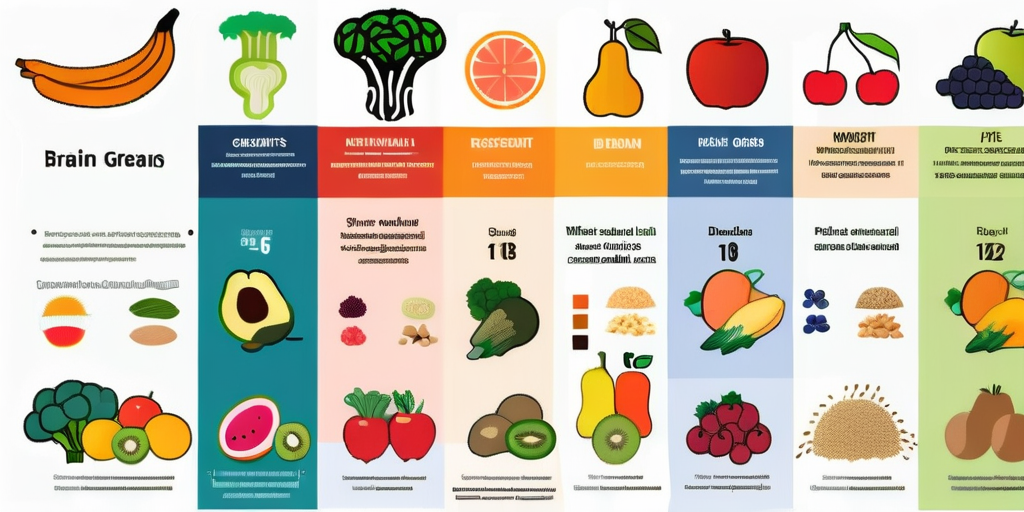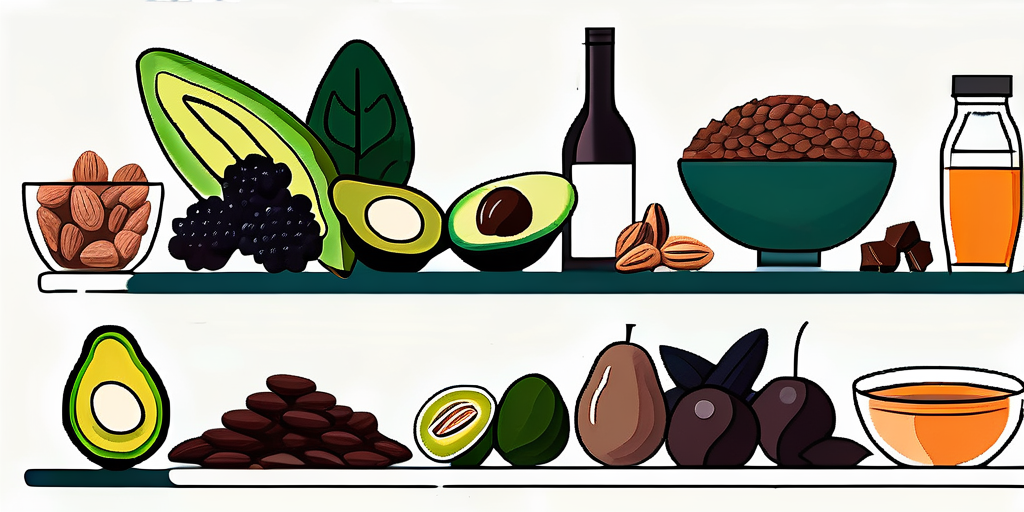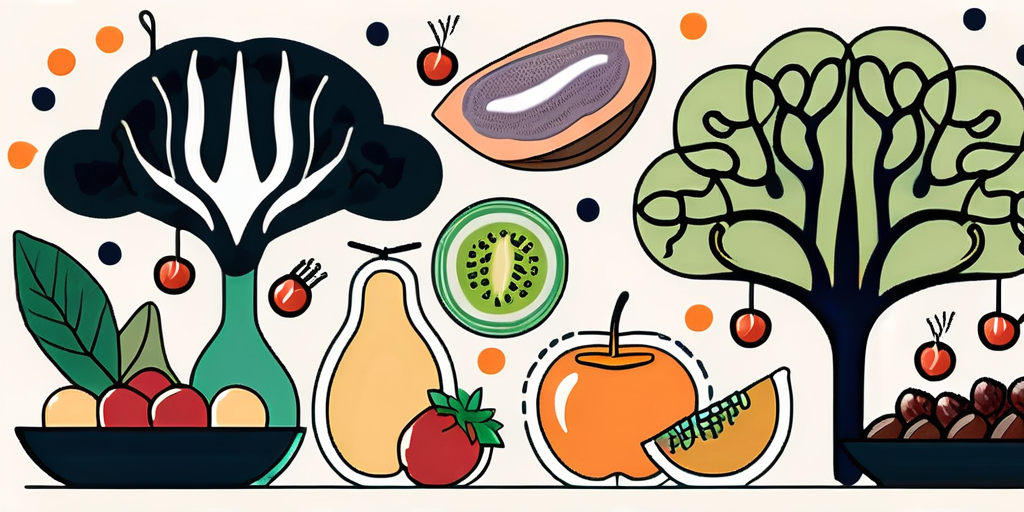Eating a well-balanced diet not only benefits our physical health but also plays a vital role in maintaining optimal brain function. Research has shown that certain nutrients can enhance cognitive function, while poor nutrition can have a negative impact on brain health. By incorporating key foods into our diet, we can boost our brain power and improve our overall cognitive function. In this article, we will explore the connection between diet and brain health, highlight the best foods for enhancing brain function, provide tips on incorporating brain-boosting foods into our daily meals, and discuss the science behind these food choices.
Understanding the Connection Between Diet and Brain Health
It is important to recognize the strong link between our diet and brain health. The food we consume provides our brains with the necessary nutrients to function properly. Just like any other organ, the brain requires specific nutrients to maintain optimal performance. Research has demonstrated that certain nutrients can enhance cognitive abilities, improve memory, and slow down the aging process of the brain.

When it comes to brain health, it's not just about eating any kind of food. It's about consuming a balanced diet that includes a variety of nutrients that support brain function. Let's explore some of these nutrients and their role in cognitive function.
The Role of Nutrients in Cognitive Function
Essential nutrients such as vitamins, minerals, and fatty acids play a crucial role in cognitive function. For example, omega-3 fatty acids, commonly found in fatty fish like salmon and mackerel, have been linked to improved memory and brain health. These fatty acids are essential for the structure and function of brain cells, and they also have anti-inflammatory properties that protect the brain from damage.
Antioxidants found in berries, such as blueberries and strawberries, help protect brain cells from oxidative stress. Oxidative stress occurs when there is an imbalance between free radicals and antioxidants in the body, leading to cell damage. By consuming foods rich in antioxidants, we can reduce the risk of cognitive decline and improve overall brain health.
Additionally, healthy fats from nuts and seeds promote brain health by reducing inflammation and providing energy for optimal brain function. Walnuts, for example, are a great source of alpha-linolenic acid (ALA), a type of omega-3 fatty acid that has been shown to improve cognitive performance.
Furthermore, vitamins and minerals such as vitamin E, vitamin B12, and folate are essential for brain health. Vitamin E acts as an antioxidant and protects cell membranes from oxidative damage. Vitamin B12 is involved in the production of neurotransmitters, which are essential for proper brain function. Folate, on the other hand, plays a role in the synthesis of DNA and RNA, which are necessary for the growth and repair of brain cells.
How Poor Nutrition Impacts Brain Health
On the other hand, a diet lacking in essential nutrients can negatively impact brain health. Studies have shown that diets high in saturated fats and processed foods can contribute to cognitive decline and increase the risk of neurological disorders such as Alzheimer's disease. These unhealthy fats can clog the arteries and restrict blood flow to the brain, impairing its function.
Consuming excessive amounts of sugar and unhealthy fats can also lead to inflammation in the brain. Chronic inflammation has been linked to various neurological conditions, including depression, anxiety, and neurodegenerative diseases. Inflammation can disrupt the communication between brain cells and impair cognitive function.
Moreover, poor nutrition can lead to deficiencies in essential vitamins and minerals, which can further compromise brain health. For example, a deficiency in vitamin B12 can cause memory problems and difficulty concentrating.
It is clear that the connection between diet and brain health is significant. By adopting a diet rich in nutrients, we can support our brain's function and reduce the risk of cognitive decline. Incorporating foods like fatty fish, berries, nuts, and seeds into our diet can provide the necessary nutrients to keep our brains healthy and functioning optimally.
Key Foods for Enhancing Brain Health
Now that we understand the connection between diet and brain health, let's explore the key foods that can help boost cognitive function and enhance brain health:
Our brain is a remarkable organ that requires proper nourishment to function at its best. By incorporating certain foods into our diet, we can support the structure of brain cells, reduce inflammation, and promote better cognitive function. Here are some key foods that have been shown to enhance brain health:
Fatty Fish and Omega-3s
Fatty fish such as salmon, mackerel, and sardines are not only delicious but also rich in omega-3 fatty acids. These healthy fats are essential for brain health as they support the structure of brain cells, reduce inflammation, and promote better cognitive function. Omega-3 fatty acids have been linked to improved memory and focus, making them an important part of a brain-boosting diet. Aim to incorporate fatty fish into your diet at least twice a week to reap the benefits.
In addition to fatty fish, other sources of omega-3 fatty acids include flaxseeds, chia seeds, and walnuts. These plant-based options are excellent alternatives for those who follow a vegetarian or vegan diet.
Berries and Antioxidants
Blueberries, strawberries, and other dark-colored berries are not only delicious but also packed with antioxidants. These powerful compounds help protect the brain from oxidative stress and inflammation, which can improve brain function and delay age-related memory decline. Antioxidants have been shown to have a positive impact on cognitive abilities, making berries an excellent choice for a brain-boosting snack.
In addition to berries, other fruits rich in antioxidants include oranges, grapes, and cherries. By incorporating a variety of colorful fruits into your diet, you can provide your brain with a wide range of beneficial antioxidants.
Nuts and Seeds for Healthy Fats
Include a variety of nuts and seeds such as walnuts, almonds, flaxseeds, and chia seeds in your diet to support brain health. These foods are excellent sources of healthy fats, antioxidants, and vitamins that benefit brain function. The monounsaturated fats found in nuts and seeds have been associated with improved cognitive function and a reduced risk of age-related cognitive decline.
Snack on a handful of nuts or sprinkle seeds on your salads or yogurt for a brain-boosting treat. Not only are they convenient and delicious, but they also provide a satisfying crunch and a nutrient-packed punch.
Green Tea and Caffeine
Green tea is not only a refreshing beverage but also a brain-boosting elixir. It contains both caffeine and antioxidants, making it a great choice for enhancing cognitive function. Caffeine promotes alertness, concentration, and improved mood, while the antioxidants found in green tea have a neuroprotective effect, helping to safeguard the brain against age-related decline.
Enjoy a cup of green tea in the morning to jumpstart your day and give your brain a natural boost. It's a healthier alternative to sugary energy drinks and provides a gentle, sustained energy lift without the jitters often associated with excessive caffeine consumption.
By incorporating these key foods into your diet, you can give your brain the nourishment it needs to thrive. Remember, a healthy brain is a happy brain!
Incorporating Brain-Boosting Foods into Your Diet
Now that we know the key foods for enhancing brain health, let's explore practical ways to incorporate them into our daily meals:

When it comes to brain health, creating balanced meals is essential. By planning your meals with a variety of nutrient-rich foods, you can ensure that your brain receives the fuel it needs to function at its best. Aim for a balanced plate that includes lean proteins, whole grains, plenty of fruits and vegetables, and sources of healthy fats. This combination of foods provides a wide range of vitamins, minerals, and antioxidants that support brain health.
Incorporating fatty fish into your meals is a great way to boost brain health. Fish like salmon, mackerel, and sardines are rich in omega-3 fatty acids, which are essential for brain function. Omega-3s have been shown to improve memory and cognitive performance. Try grilling or baking a piece of salmon and serving it with a side of quinoa and steamed vegetables for a brain-healthy meal.
In addition to fatty fish, including berries in your diet is another excellent way to support brain health. Berries, such as blueberries, strawberries, and blackberries, are packed with antioxidants that help protect the brain from oxidative stress and inflammation. They also contain flavonoids, which have been shown to improve memory and cognitive function. Add a handful of mixed berries to your morning oatmeal or yogurt for a delicious and brain-boosting breakfast.
Don't forget about nuts and seeds! These little powerhouses are packed with nutrients that support brain health. Walnuts, in particular, are a great source of omega-3 fatty acids, while almonds and cashews provide vitamin E, which is essential for cognitive function. Snack on a handful of mixed nuts during the day or sprinkle some chia seeds on your salad for an extra brain-boosting punch.
When it comes to snacking, it's important to choose brain-healthy options that will keep you energized throughout the day. Instead of reaching for sugary or processed snacks, opt for nutrient-dense choices. For example, a handful of mixed nuts provides healthy fats and protein, which can help improve focus and concentration. Yogurt topped with berries is another great option, as it combines the brain-boosting benefits of berries with the probiotics found in yogurt, which support gut health and overall brain function. Vegetable sticks with hummus are also a fantastic choice, as they provide a combination of fiber, vitamins, and minerals that promote brain health.
If you're looking for quick and easy brain-healthy recipes, there are plenty available online. Experiment with dishes that incorporate the key foods mentioned earlier. For example, try a salmon and quinoa salad with a side of mixed berries for a nutritious and delicious meal. You can also explore recipes for smoothies that include brain-boosting ingredients like spinach, avocado, and berries. The possibilities are endless!
The Science Behind Brain-Boosting Foods
The positive impact of diet on brain health has been extensively researched. Numerous studies have demonstrated the beneficial effects of certain nutrients on cognitive function, memory, and overall brain health.

When it comes to brain health, what we eat matters. Our brains require a steady supply of nutrients to function optimally. Just like a well-oiled machine, our brains need the right fuel to perform at their best.
Research has shown that specific nutrients, such as omega-3 fatty acids found in fish, can have a significant impact on cognitive function. In fact, a study conducted on a large group of individuals found that those who consumed higher amounts of fish had a slower cognitive decline compared to those who consumed less fish. This suggests that incorporating brain-boosting foods into our diets can have a positive effect on our brain health.
Research on Diet and Cognitive Function
Scientists have conducted numerous studies to explore the relationship between diet and cognitive function. These studies have provided valuable insights into the impact of specific nutrients on our brain health.
In addition to omega-3 fatty acids, other nutrients have also been found to play a role in cognitive function. For example, antioxidants found in fruits and vegetables have been shown to protect the brain from oxidative stress, which can contribute to cognitive decline. Furthermore, vitamins and minerals, such as vitamin E and B vitamins, have been linked to improved memory and overall brain health.
Understanding the relationship between diet and cognitive function is crucial for developing strategies to promote brain health. By identifying the specific nutrients that have a positive impact on cognitive function, researchers can explore targeted dietary interventions to enhance brain health.
The Future of Nutritional Neuroscience
The field of nutritional neuroscience is rapidly advancing, with ongoing research focused on unraveling the intricate connection between diet and brain health. Scientists are delving deeper into the mechanisms behind the impact of certain nutrients on cognitive function.
Advancements in technology, such as brain imaging techniques, have allowed researchers to observe the effects of different nutrients on brain activity. These studies provide valuable insights into how specific nutrients influence brain function and can help guide the development of personalized dietary recommendations for optimal brain health.
As our understanding of the science behind brain-boosting foods continues to grow, we can expect further advancements in developing targeted dietary strategies to enhance brain health. This knowledge has the potential to revolutionize the way we approach brain health and could have significant implications for preventing age-related cognitive decline and neurodegenerative diseases.
Conclusion
In conclusion, the importance of maintaining a healthy diet for brain health cannot be overstated. By incorporating key foods such as fatty fish, berries, nuts, and seeds into our daily meals, we can support cognitive function, improve memory, and protect our brains from age-related decline. Making conscious choices about the foods we eat can truly boost our cognitive function and enhance overall brain health. So, let's nourish our bodies and minds with the best foods for brain health and enjoy the benefits of a sharper and more resilient brain!




